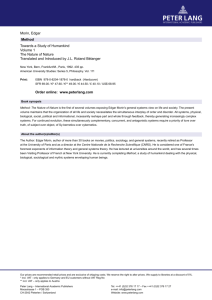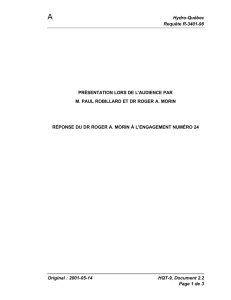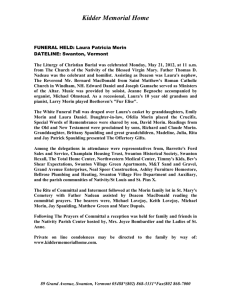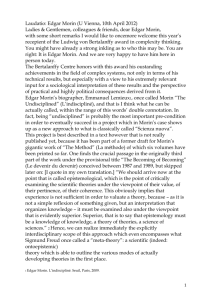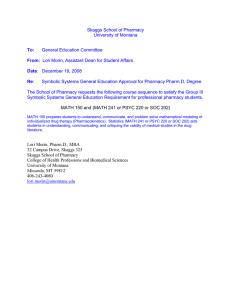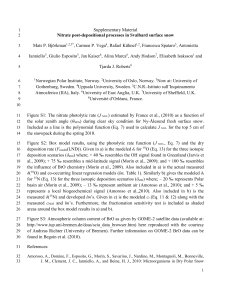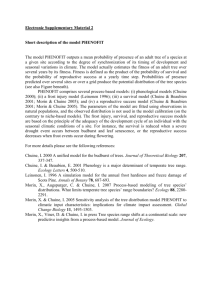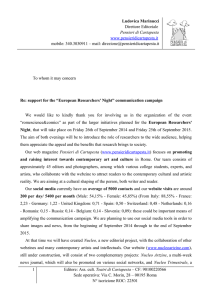INFORMATION REQUESTS FOR ROGER A. MORIN (RAM) In the matter of:
advertisement
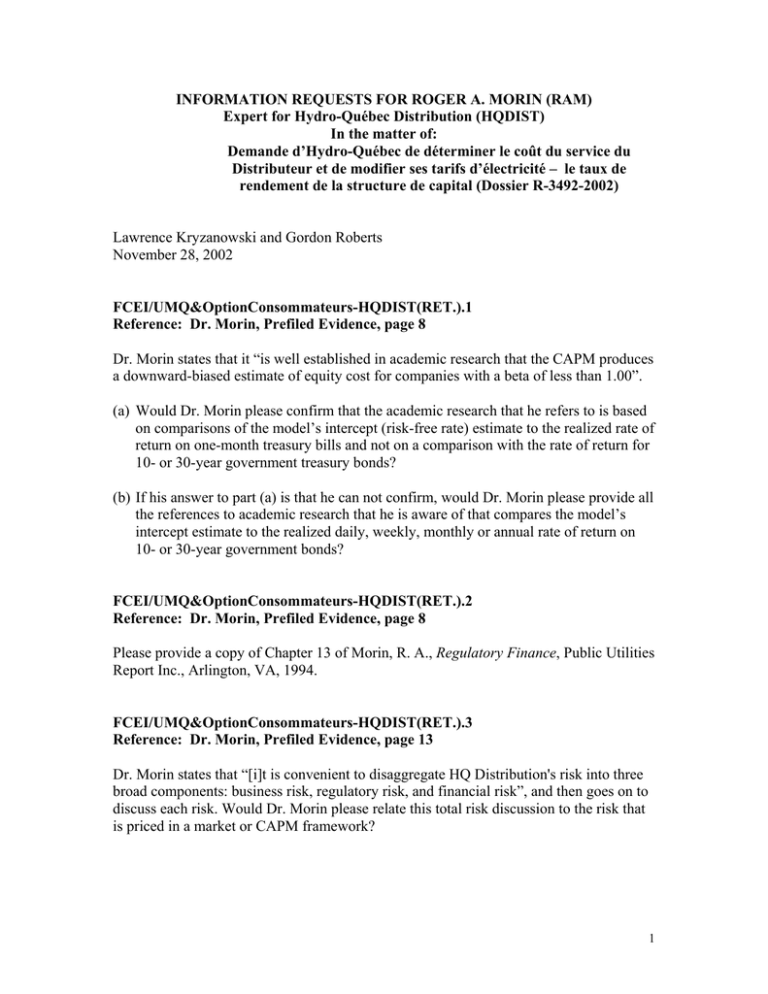
INFORMATION REQUESTS FOR ROGER A. MORIN (RAM) Expert for Hydro-Québec Distribution (HQDIST) In the matter of: Demande d’Hydro-Québec de déterminer le coût du service du Distributeur et de modifier ses tarifs d’électricité – le taux de rendement de la structure de capital (Dossier R-3492-2002) Lawrence Kryzanowski and Gordon Roberts November 28, 2002 FCEI/UMQ&OptionConsommateurs-HQDIST(RET.).1 Reference: Dr. Morin, Prefiled Evidence, page 8 Dr. Morin states that it “is well established in academic research that the CAPM produces a downward-biased estimate of equity cost for companies with a beta of less than 1.00”. (a) Would Dr. Morin please confirm that the academic research that he refers to is based on comparisons of the model’s intercept (risk-free rate) estimate to the realized rate of return on one-month treasury bills and not on a comparison with the rate of return for 10- or 30-year government treasury bonds? (b) If his answer to part (a) is that he can not confirm, would Dr. Morin please provide all the references to academic research that he is aware of that compares the model’s intercept estimate to the realized daily, weekly, monthly or annual rate of return on 10- or 30-year government bonds? FCEI/UMQ&OptionConsommateurs-HQDIST(RET.).2 Reference: Dr. Morin, Prefiled Evidence, page 8 Please provide a copy of Chapter 13 of Morin, R. A., Regulatory Finance, Public Utilities Report Inc., Arlington, VA, 1994. FCEI/UMQ&OptionConsommateurs-HQDIST(RET.).3 Reference: Dr. Morin, Prefiled Evidence, page 13 Dr. Morin states that “[i]t is convenient to disaggregate HQ Distribution's risk into three broad components: business risk, regulatory risk, and financial risk”, and then goes on to discuss each risk. Would Dr. Morin please relate this total risk discussion to the risk that is priced in a market or CAPM framework? 1 FCEI/UMQ&OptionConsommateurs-HQDIST(RET.).4 Reference: Dr. Morin, Prefiled Evidence, page 15 Dr. Morin identifies as a risk facing HQ Distribution: “the obligation …to purchase power for an unknown and varying group of its ratepayers as a provider of last resort. The latter will result in supply (power procurement) risks”. Please provide examples of all recent instances in which HQ Distribution has actually experienced such risks. FCEI/UMQ&OptionConsommateurs-HQDIST(RET.).5 Reference: Dr. Morin, Prefiled Evidence, pages 15 and 16 Please clarify the time horizons for “the medium term” and “longer term”. Kindly indicate how these horizons compare with the period for which the rate to be determined in this hearing is expected to prevail. FCEI/UMQ&OptionConsommateurs-HQDIST(RET.).6 Reference: Dr. Morin, Prefiled Evidence, page 17 Please provide all examples of which Dr. Morin is aware of instances of forecasting risk. For each example, kindly explain whether the risk was mitigated by an ex post adjustment. In addition, please explain briefly any other techniques of which Dr. Morin is aware that allow utilities to mitigate forecasting risk. FCEI/UMQ&OptionConsommateurs-HQDIST(RET.).7 Reference: Dr. Morin, Prefiled Evidence, page 17 Please clarify the time horizon over which Dr. Morin expects that HQ Distribution could be at significant risk of market loss to natural gas. FCEI/UMQ&OptionConsommateurs-HQDIST(RET.).8 Reference: Dr. Morin, Prefiled Evidence, page 17 Would Dr. Morin please provide the following: (a) The percentage of HQ Distribution’s sales tied to specific commodity prices for each of the last three fiscal years. (b) The percentage of each of the sales in (a) that are hedged using derivative markets or other such hedges? 2 FCEI/UMQ&OptionConsommateurs-HQDIST(RET.).9 Reference: Dr. Morin, Prefiled Evidence, page 18 Please provide all examples of which Dr. Morin is aware of instances in which “large volume users…bypass the network and or …seek alternative energy providers”. FCEI/UMQ&OptionConsommateurs-HQDIST(RET.).10 Reference: Dr. Morin, Prefiled Evidence, page 18 Dr. Morin notes that “operating leverage” is “especially acute for HQ Distribution”. Would he please provide his calculations on an annual basis for the most recent five-year period, with and without the inclusion of extraordinary operating costs. FCEI/UMQ&OptionConsommateurs-HQDIST(RET.).11 Reference: Dr. Morin, Prefiled Evidence, page 18 Dr. Morin notes that Standard & Poor’s “utilizes a business risk ranking system of 1-10 for utilities whose debt securities it rates”. (a) Would Dr. Morin please confirm that the system is for business risk? (b) Would Dr. Morin please confirm that this ranking is for each utility’s own business risk and not the business risk that is priced by equity investors? FCEI/UMQ&OptionConsommateurs-HQDIST(RET.).12 Reference: Dr. Morin, Prefiled Evidence, page 19 Kindly provide Dr. Morin’s views on whether regulators should consider regulatory risks in their assessment of the business risks facing HQ Distribution. FCEI/UMQ&OptionConsommateurs-HQDIST(RET.).13 Reference: Dr. Morin, Prefiled Evidence, page 19 Would Dr. Morin please provide his business risk ranking for TransEnergie given his statement that “HQ Distribution’ business risk is certainly higher than TransEnergie’s”? FCEI/UMQ&OptionConsommateurs-HQDIST(RET.).14 Reference: Dr. Morin, Prefiled Evidence, page 21 Dr. Morin states: “HQ Distribution’s very high debt ratio makes it particularly vulnerable to financial risk”. Please confirm that this refers to the company’s actual debt ratio. If 3 not, please explain the reference. If so, kindly identify any factors of which Dr. Morin is aware that mitigate this risk for HQ Distribution. FCEI/UMQ&OptionConsommateurs-HQDIST(RET.).15 Reference: Dr. Morin, Prefiled Evidence, page 22 Dr. Morin states that he has “employed the common practice of using adjusted betas, rather than raw betas, as recommended in most college-level investment textbooks”. Would Dr. Morin please provide the references to all the college-level investment textbooks that recommend the use of adjusted betas? FCEI/UMQ&OptionConsommateurs-HQDIST(RET.).16 Reference: Dr. Morin, Prefiled Evidence, page 23 Would Dr. Morin please provide the formula used by Value Line to calculate the adjusted betas reported in the May 2002 edition of the Value Line Investment Survey for Windows. FCEI/UMQ&OptionConsommateurs-HQDIST(RET.).17 Reference: Dr. Morin, Prefiled Evidence, page 24 Would Dr. Morin please explain why the post-deregulation beta would be expected to be lower than the pre-deregulation beta? FCEI/UMQ&OptionConsommateurs-HQDIST(RET.).18 Reference: Dr. Morin, Prefiled Evidence, page 24 Would Dr. Morin please confirm that: (a) Beta is a relative measure of risk; (b) A different beta value is obtained for each chosen proxy for the market? FCEI/UMQ&OptionConsommateurs-HQDIST(RET.).19 Reference: Dr. Morin, Prefiled Evidence, page 25 Dr. Morin states that an unlevered beta can be calculated using equation (3). (a) Would Dr. Morin please confirm that equation (3) is correct as stated? 4 (b) Would Dr. Morin please provide the simplifying assumptions that he made to obtain equation (3). FCEI/UMQ&OptionConsommateurs-HQDIST(RET.).20 Reference: Dr. Morin, Prefiled Evidence, pages 27 & 28 For one of his historical and prospective risk-premium estimates, Dr. Morin uses the Ibbotson Associates study, Stocks, Bonds, Bills, and Inflation, 2002 Yearbook, which compiles historical security returns for the U.S. from 1926 to 2001. (a) How does the risk premium estimate for the U.S. obtained from this study using returns from 1926 to 2001 compare with U.S. studies for longer time periods? (b) Why did Dr. Morin not use the estimates for the U.S. for longer time periods? FCEI/UMQ&OptionConsommateurs-HQDIST(RET.).21 Reference: Dr. Morin, Prefiled Evidence, pages 28 & 29 Dr. Morin states that: “When estimating the cost of capital, only arithmetic means are correct. Looking forward, the expected return is an arithmetic mean.” Would Dr. Morin provide all the evidence that he is aware of for the use of the geometric mean or a weighted average of the arithmetic and geometric means as an expected return proxy when looking forward. FCEI/UMQ&OptionConsommateurs-HQDIST(RET.).22 Reference: Dr. Morin, Prefiled Evidence, page 29 For his fifth guide to his chosen range of market risk premiums, Dr. Morin conducts a DCF analysis using projections (of growth rates etc.) obtained from Value Line’s VLIS 05/2002 edition. (a) What adjustment for optimism bias did Dr. Morin make to the projected growth rate for the Value Line common stocks? (b) The projected growth rates are for what time horizon? (c) Would Dr. Morin confirm that he used the constant growth version of the Gordon valuation model for his aggregate Canadian equity market calculation? If not, would he specify what DCF model he used? (d) Did Dr. Morin use an equally weighted dividend yield? (e) Did Dr. Morin use an equally weighted projected growth rate for dividends? 5 (f) Would Dr. Morin confirm that the projected growth range of 5.4% to 15.1% is for dividends? If not, would he please detail how he obtained the dividend growth rate? (g) How frequent were nondividend-paying companies in his sample and how did Dr. Morin deal with nondividend-paying companies? FCEI/UMQ&OptionConsommateurs-HQDIST(RET.).23 Reference: Dr. Morin, Prefiled Evidence, pages 29 & 30 As the sixth guide, Dr. Morin applies a DCF analysis to the U.S. aggregate equity market. Would Dr. Morin please discuss the effect on his expected return on the aggregate equity market of only using dividend-paying stocks covered by Value Line? FCEI/UMQ&OptionConsommateurs-HQDIST(RET.).24 Reference: Dr. Morin, Prefiled Evidence, page 30 Would Dr. Morin please provide the beginning-of-the-year Value Line forecast for that year’s return on the Value Line Composite Index for 1998, 1999, 2000 and 2001? Would Dr. Morin please provide the actual return on the Value Line Composite Index for each of these four years? FCEI/UMQ&OptionConsommateurs-HQDIST(RET.).25 Reference: Dr. Morin, Prefiled Evidence, page 31 (a) If markets are integrated, does Dr. Morin believe that the nondiversifiable risks are equivalent in magnitude for the U.S. and Canadian market proxies? (b) If his answer to part (a) is yes, would he please explain the rationale for this belief? (c) If his answer to part (a) is no, would he please explain how this was reflected in his use of U.S. market risk premium for the Canadian market? FCEI/UMQ&OptionConsommateurs-HQDIST(RET.).26 Reference: Dr. Morin, Prefiled Evidence, pages 40-41 Please confirm that in its September 2002 issue, Consensus Forecasts reports the following forecasts for the yield on 10-year Government of Canada bonds: 5.2% for December 2002 and 5.7% for September 2003 for a midpoint of 5.45%. Please confirm that as of late November 2002, the yield on 30-year Canada’s was approximately 5.50%. Based on these two confirmations, kindly explain Dr. Morin’s updated views on the appropriate long-term rate for use in determining HQ Distribution’s ROE. 6 FCEI/UMQ&OptionConsommateurs-HQDIST(RET.).27 Reference: Dr. Morin, Prefiled Evidence, page 45 Dr. Morin includes U.S. energy utilities in his comparisons of equity ratios. Does Dr. Morin agree that energy distribution in the U.S. is farther along in the process of deregulation? If not, please explain why not. If so, kindly explain Dr. Morin’s view of how greater deregulation affects the amount of equity carried by utilities. FCEI/UMQ&OptionConsommateurs-HQDIST(RET.).28 Reference: Dr. Morin, Prefiled Evidence, page 45 and Exhibits RAM 12 -14 Please describe how convertible instruments were dealt with in the calculation of the common equity ratios reported in these exhibits. FCEI/UMQ&OptionConsommateurs-HQDIST(RET.).29 Reference: Dr. Morin, Prefiled Evidence, pages 45-46 Dr. Morin notes that HQ Distribution’s capital structure “contains a smaller common equity capital base than Canadian publicly-owned electric utilities, and a substantially smaller common equity base than comparable investor-owned energy utilities. This is turn results in very low interest coverages”. Please explain Dr. Morin’s views on whether there is a risk that HQ will be downgraded from its present “A” credit rating. FCEI/UMQ&OptionConsommateurs-HQDIST(RET.).30 Reference: Dr. Morin, Prefiled Evidence, page 46 Dr. Morin refers to “the need to maintain the company’s current bond rating”. Please discuss all difficulties you can identify that have faced Emera in light of its downgrade by S&P to BBB. FCEI/UMQ&OptionConsommateurs-HQDIST(RET.).31 Reference: Dr. Morin, Prefiled Evidence, page 46 Please confirm that in its decision of October 23, 2002, the Nova Scotia Utilities and Review Board declined to increase the allowed equity ratio for Nova Scotia Power above its prior level of 35%. Please compare the degree of business risk of NS Power, an integrated utility, with that of HQ Distribution. Please explain why 35% is not a sufficient equity ratio for HQ Distribution. FCEI/UMQ&OptionConsommateurs-HQDIST(RET.).32 7 Reference: Dr. Morin, Prefiled Evidence, Appendix A, page 3 Please discuss the limitations of the constant growth dividend-discount model. Please explain why a multi-stage DCF method of estimating the cost of equity was not used, and what are the limitations of this more realistic model. FCEI/UMQ&OptionConsommateurs-HQDIST(RET.).33 Reference: Dr. Morin, Prefiled Evidence, Appendix B, page 1: Would Dr. Morin please provide all the evidence that he is aware of that the impact of diversification and restructuring activities in recent years and the impact of abnormal weather patterns has differed from that in the past? FCEI/UMQ&OptionConsommateurs-HQDIST(RET.).34 Reference: Dr. Morin, Prefiled Evidence, Appendix B, page 6: Would Dr. Morin please explain how the application of the DCF model to a broad aggregate of companies mitigates measurement difficulties when the companies are drawn from the same industrial sector? FCEI/UMQ&OptionConsommateurs-HQDIST(RET.).35 Reference: Dr. Morin, Prefiled Evidence, Appendix C, page 2: Dr. Morin refers to a “comprehensive study of beta measurement by Kryzanowski and Jalilvand” for U.S. utility betas. Would Dr. Morin please summarize the conclusions of this study with regard to the performance of Value Line type of beta adjustments for utilities? FCEI/UMQ&OptionConsommateurs-HQDIST(RET.).36 Reference: Dr. Morin, Prefiled Evidence, Appendix C, page 3: Dr. Morin examines “the beta risk measure of a sample of distribution electric utilities over the 1992-1997 period”. (a) Please provide the sample of distribution electric utilities whose beta trend is shown on the graph on this page. (b) Why do the betas for the electric distribution utilities displayed in the graph shown on this page stop with the year 1997? FCEI/UMQ&OptionConsommateurs-HQDIST(RET.).37 8 Reference: Dr. Morin, Prefiled Evidence, Appendix C, page 6: Would Dr. Morin please provide the theoretical justification for the so-called “empirical CAPM”? FCEI/UMQ&OptionConsommateurs-HQDIST(RET.).38 Reference: Dr. Morin, Prefiled Evidence, Appendix C, page 6: What was the long-term treasury bond rate over the period 1926-1984? FCEI/UMQ&OptionConsommateurs-HQDIST(RET.).39 Reference: Dr. Morin, Prefiled Evidence, Appendix C, page 7: Dr. Morin states that “[m]ost of the empirical studies cited thus far utilize raw betas rather than Value Line adjusted betas because the latter were not available over most of the time periods covered in these studies”. Would Dr. Morin explain why these studies could not have calculated adjusted betas using the adjustment procedure used by Value Line. FCEI/UMQ&OptionConsommateurs-HQDIST(RET.).40 Reference: Dr. Morin, Prefiled Evidence, Appendix C, page 7: Dr. Morin states that “another empirical investigation of the relationship between return and Value Line adjusted betas was concluded in 2000 by Dr. Morin, and found a statistical relationship that is quite consistent with the general findings of the literature and with the earlier study”. Please provide a copy of the 2000 study by Dr. Morin on the relationship between return and Value Line adjusted betas. FCEI/UMQ&OptionConsommateurs-HQDIST(RET.).41 Reference: Dr. Morin, Prefiled Evidence, Appendix C, page 8: Dr. Morin states that a “study of the relationship between return and adjusted beta is reported on Table 6-7 in Ibbotson Associates Valuation Yearbook 2001”. He goes to state that “[y]et another study was recently concluded by Dr. Morin in May 2002 in support of the empirical validity of the CAPM”. Please provide a copy of Table 6-7 in Ibbotson Associates Valuation Yearbook 2001 and all related discussion. Please provide a copy of the May 2002 study by Dr. Morin in support of the empirical validity of the CAPM. FCEI/UMQ&OptionConsommateurs-HQDIST(RET.).42 Reference: Dr. Morin, Prefiled Evidence, Appendix C, pages 8 and 9: 9 Please provide the specifics (details) on the regression reported at the bottom of page 8 and top of page 9. This should include estimated coefficients along with their t- or pvalues and so forth. FCEI/UMQ&OptionConsommateurs-HQDIST(RET.).43 Reference: Dr. Morin, Prefiled Evidence, Appendix C, pages 8 and 9: Dr. Morin states that the “observed intercept is higher than the prevailing risk-free rate of 5.7%”. Please provide the long Treasury rate that corresponds to “the prevailing risk-free rate of 5.7%”? FCEI/UMQ&OptionConsommateurs-HQDIST(RET.).44 Reference: Dr. Morin, Prefiled Evidence, Exhibit RAM-2: Please indicate how the betas change if 5 years of monthly returns instead of 5 years of weekly returns are used in their estimation. FCEI/UMQ&OptionConsommateurs-HQDIST(RET.).45 Reference: Dr. Morin, Prefiled Evidence, Exhibit RAM-1, page 1 of 2: Please provide the beta risk measures for 1998-2001 for the same utilities. FCEI/UMQ&OptionConsommateurs-HQDIST(RET.).46 Reference: Dr. Morin, Prefiled Evidence, Exhibit RAM-5, page 1 of 2: Please explain why values are missing for 1998, 1999 and 2000 for KeySpan Energy. FCEI/UMQ&OptionConsommateurs-HQDIST(RET.).47 Reference: Dr. Morin, Prefiled Evidence, Exhibit RAM-7: Please provide the initial and ending compositions, and all composition changes in the Moody’s Electric Utility Stock Index over the studied period. Please indicate how utility failures were dealt with in this index. 10
